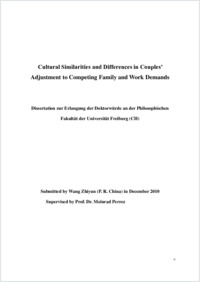Cultural similarities and differences in couples' adjustment to competing family and work demands
- Wang, Zhiyun
- Perrez, Meinrad (Degree supervisor)
-
15.12.2010
56 p
Thèse de doctorat: Université de Fribourg, 2010
English
Conflicting work and family demands can lead to individual and interpersonal stress in close relationships. The literature suggests that individuals from various cultural contexts differ in how they organize domestic work in the family and in the support they receive from other persons. At the same time, past findings suggest effects of culture on individuals’ emotional behaviors and expression, and on the regulation of negative emotions. Although these topics are likely strongly interconnected, they have rarely been considered together and the cultural differences found are insufficiently understood. The current thesis combines five studies conducted to better understand how culture influences married partners’ behavior and emotion when managing their daily life between the family and the workplace. This research is based on ambulatory assessment data from 623 dual-earner couples from eight cultural contexts. This approach provides good validity to explore individuals’ daily family behavior and emotional experience. We examined working couples’ family work organization, including third party’s contribution, considering collectivistic values at social and individual levels. Moreover, we investigated spouses’ emotional experiences under stressful everyday life conditions in different cultures, and examined the interpersonal consequences and subsequent regulation and recovery of affective experiences. The results showed that spouses in collectivistic cultures received more support from extended family, which might result in a more equal division of family work between spouses. In addition, spouses were more likely to suppress their negative emotional responses to relational stress, and these negative emotions showed more cross-over effects between spouses, while spouses needed more time to recover under relational stress in collectivistic cultures than in individualistic cultures. Overall, the findings provided further evidence to a cultural effect on individuals’ daily behavior and emotional experience in close relationships.
- Faculty
- Faculté des lettres et des sciences humaines
- Language
-
- English
- Classification
- Psychology
- Notes
-
- Ressource en ligne consultée le 22.12.2010
- License
-
License undefined
- Identifiers
-
- RERO DOC 21339
- URN urn:nbn:ch:rero-002-109771
- RERO R005884214
- Persistent URL
- https://folia.unifr.ch/unifr/documents/301667
Statistics
Document views: 357
File downloads:
- Texte intégral: 177
